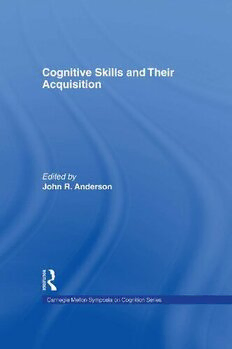
Cognitive Skills and Their Acquisition PDF
Preview Cognitive Skills and Their Acquisition
229x152 HB COGNITIVE SKILLS AND THEIR ACQUISITION Edited by JOHN R. ANDERSON CARNEGIE-MELLON UNIVERSITY ~ ~~~!~~n~~~up NEWYORK ANDLONDON FirstPublishedby LawrenceErlbaum Associates, Inc., Publishers 365 Broadway Hillsdale, NewJersey 07642 Thiseditionpublished2011byRoutledge 711ThirdAvenue,NewYork,NY10017 2ParkSquare,MiltonPark,Abingdon,Oxon,OX144RN Copyright © 1981 by LawrenceErlbaumAssociates, Inc. Allrightsreserved. No partofthis bookmay bereproduced in any fonn, byphotostat, microfonn, retrieval system, orany other means, withouttheprior written pennission ofthepublisher Library ofCongress Cataloging in Publication Data SymposiumonCognition, 16th,Carnegie-Mellon Uni versity, 1980. Cognitive skills and theiracquisitions. Bibliography: p. Includesindex. 1. Cognition-Congresses. 2. Learning, Psychology of-Congresses. I. Anderson, John Robert, 1947- II. Title. [DNLM: 1. Cognition-Congresses. 2. Learning -Congresses. W3 C126B 16th 1980c/ BF311 C6785 1980] BF311.S83 1980 153.4 80-28702 ISBN0-89859-093-0 Publisher'sNote Thepublisherhasgonetogreatlengthstoensurethequalityofthisreprint butpointsoutthatsomeimperfectionsintheoriginalmaybeapparent. TO THE MEMORY OF OUR COLLEAGUE LEE W. GREGG WHO, AS MEMBER AND HEAD OF THE PSYCHOLOGY DEPARTMENT AT CARNEGIE-MELLON UNIVERSITY, FOR A QUARTER CENTURY GAVE HIS ENERGIES AND TALENTS UNSELFISHLYTO OUR EXPLORATION OF THE NEW DOMAINS IN COGNITIVE PSYCHOLOGY. Contents Preface xi 1. Mechanismsof Skill Acquisition and the Law of Practice Allen Newell and Paul S. Rosenbloom 1 Introduction 1 The Ubiquitous Law of Practice 3 Basics About Power Laws 17 Fitting the Data To a Family of Curves 23 Possible Explanations 34 Conclusion 51 2. Knowledge Compilation: Mechanisms for the Automatization of Cognitive Skills David M. Neves andJohn R. Anderson 57 Introduction 57 Encoding 60 Proceduralization 65 Composition 67 Effects of Practice 72 Conclusion 82 vii viii CONTENTS 3. Skill In Algebra Clayton Lewis 85 Abstract 85 Introduction 85 Framework 86 Hypotheses About Skilled Performance 87 Subjects 89 The Problems 90 Procedure 90 Length of Solutions 91 Stategic Choices 91 Powerful Operators 96 The Formation ofCombined Operations 98 Combining Transposing and Collecting 104 Experts Make Mistakes 106 Why Do They Make Mistakes? 107 Reflections 107 4. The Development of Automatism Richard M. Shiffrin and Susan T. Dumais 111 Introduction 111 Automatism and Control in Search-Detection Tasks 112 A Definition of and Test for Automatism 115 The Development of Automatism 125 What is Learned During Automatization? 131 The Loss of Automatism 138 Automatization in Skill Development 138 5. Skilled Memory William G. Chase and K. Anders Ericsson. ..................... 141 Introduction 141 The Learning Curve 143 The Mnemonic System 146 The Retrieval Structure 168 On the Speedup of Encoding and Retrieval Operators 180 Concluding Remarks 186 6. Acquisition of Problem-Solving Skill John R. Anderson, James G. Greeno, PaulJ. Kline and David M. Neves ......................................... 191 Introduction 191 A Model ofthe Skill Underlying Proof Generation 192 Learning from the Text 200 Subsumption: Learning With Understanding 205 CONTENTS ix Knowledge Compilation 214 Knowledge Optimization 221 Summary 227 7. Advice Taking and Knowledge Refinement: An Iterative View of Skill Acquisition Fredrick Hayes-Roth, Philip Klahr, and David J. Mostow ......... 231 Abstract 231 What is Learned? 231 What is Advice? 235 How Can a Learner Operationalize Advice? 237 What Kinds of Events Trigger Learning? 243 What Can Be Learned, and How is This done? 244 Conclusions 249 8. The Processes Involved in Designing Software Robin ,Jeffries, Althea A. Turner, Peter G. Polson, and MichaelE. Atwood 255 Introduction 255 Research on Design and Planning 256 ATheory of Problem Solving in Software Design 261 AComparison of Expert and Novice Design Processes 268 Discussion 279 9. Mental Models of Physical Mechanisms and Their Acquisition Johan de KleerandJohn Seely Brown 285 Introduction 285 The Motivation for Defining Some Esthetic Principles 287 The No-Function-In-Structure Principle 287 The Weak Causality Principle 288 Methodology 288 Technical Issues 289 A Simple Qualitative Model for the Buzzer 291 A Time Model ofthe Buzzer 292 A Causal Model for the Buzzer 294 No-Function-In-Structure and the Locality Principles 296 Connections and Device Topology 297 A Mythical Time Model 301 A Representation For Causal Attribution 302 Causality Principles and Envisonment 305 A Critique of the Rieger and Grinberg's Approach 306 Deletion Principle 307 Discontinuity 308 The Role of Momentum in Qualitative Reasoning 308 x CONTENTS 10. Enriching Formal Knowledge: A Model for Learning to Solve Textbook Physics Problems Jill H. Larkin 311 Introduction 311 Learning in Formal Domains 312 A Model for Problem Solving in Physics 318 Human Solvers 323 The Reality of the Model 332 Summary 333 11. Analogical Processes in Learning David E. Rumelhartand Donald A. Norman 335 Introduction 335 Some Characteristics of the Human Knowledge Representation System 336 New Schemata By Analogy With Old 343 Analogical Processes in Learning aText Editor 350 Conclusions 357 12. The Central Role of Learning in Cognition Pat Langleyand HerbertA. Simon 361 Introduction 361 Characteristics of a Good Explanation 364 Learning In Complex Systems 367 Are There General Principles of Learning? 373 Is Learning Really Invariant? 375 A Research Strategy 378 Author Index 381 Subject Index 385 Preface This book is a collection of the papers presented at the Sixteenth Annual Car negie Symposiumon Cognition, heldinMay 1980. Acouple ofyearsearlierPat LangleyandBobNechespersuadedthepsychologydepartmentabouttheneedto have a symposium on the topic oflearning, and I was recruited to organize the Symposium. Itoowaspersuadedthatthetimewasripeforanewattackonissues of learning. In separating itself from behaviorism, cognitive psychology had abandonedinterestinlearning andfor20years hadfocused onunderstandingthe performance ofestablishedcognitive skills. As aconsequence wehave acquired afairknowledge ofcognitivemechanisms, butthis knowledge ofperformanceis both disjointed and hard to use in educational applications. Learning theory offers both the potential of achieving a new degree of generality in our under standing ofhuman cognition and the possibility ofopening the way for applica tions. Given our much more sophisticated understanding of cognition, we can hope that learning mechanisms can be developed that avoid the weaknesses of pastlearningtheories. The needforanewlearningtheoryandpotentialofsucha learning theory is discussed at length in the Langley and Simon chapter. Inthepastfew years therehasdeveloped anumberofexcitingnewendeavors at understanding learning. I invited what I thought were among the best prac titionersofthis newapproachtolearning, andthey allaccepted. Thesymposium promised to be exciting and it was. It turned out that our ideas about learning weremoresimilarthanIhadexpected,givenwhatabroaddomainofphenomena mightfit underthetopic. Inparticular, wewereinterestedincognitive skillsand howtheydevelopincomplexenvironments overlongperiodsofpractice. More over, we found we were using similar manipulations, choosing similartypes of xi
